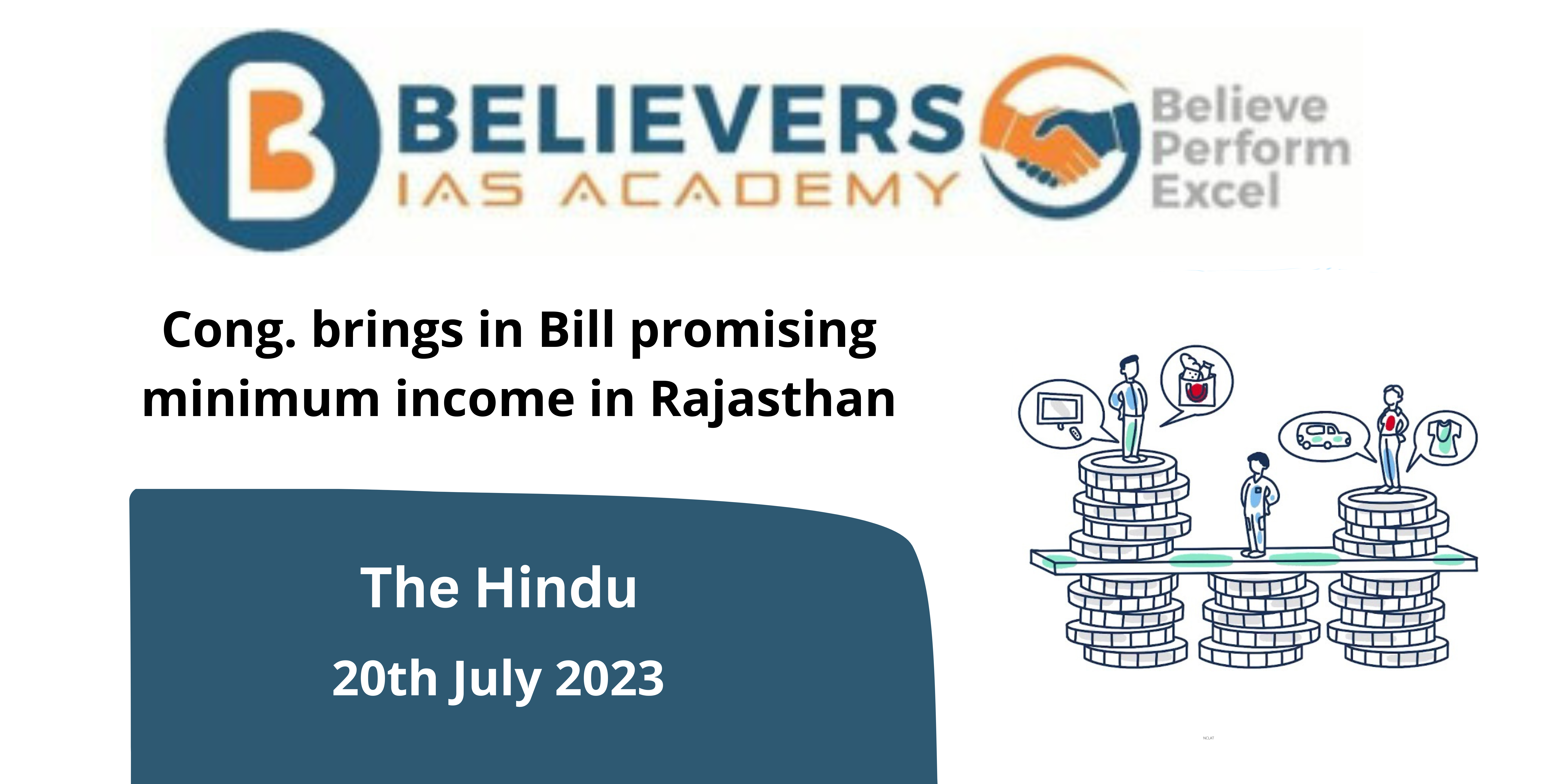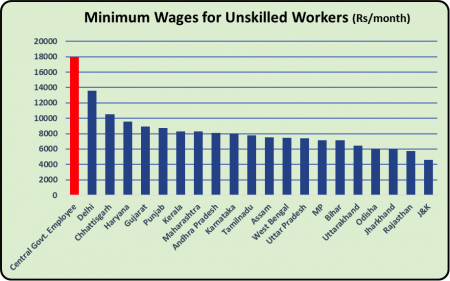Cong. brings in Bill promising minimum income in Rajasthan
Context :
The Rajasthan Minimum Guaranteed Income Bill, 2023 was tabled in the Assembly on Tuesday by the Congress-led Ashok Gehlot administration, presumably in what would be the final session before the State’s elections in less than four months.
What is Rajasthan Minimum Guaranteed Income Bill, 2023 and How is it going to be implemented?
- Bill Introduction: The Congress-led Ashok Gehlot administration introduced the Rajasthan Minimum Guaranteed Income Bill, 2023, in the State Assembly.

- Legislative Support: The bill attempts to provide Rajasthan’s urban job guarantee programs with legal support. This is the first time in the nation that such initiatives will be backed by the law.
- Pension as a Legal Right: The bill also declares pensions to be a legal right for those who qualify in the state. It guarantees that those who meet the criteria for a pension under this legislation, such as those who are elderly, differently abled, widowed, or single women, will be eligible for one.
- 15% Annual Pension Increment: The proposed legislation calls for a 15% annual increase in pension benefits. As a result, the recipients will receive improved financial support since the pension amount rises by 15% per year.
- Fulfilment of 2019 Election Promise: The measure is very close to executing the NYAY (Nyuntam Aay Yojana), which promised a minimum income of $72,000 yearly to 20% of the poorest families in the nation.
- Scope and Importance: With a $1,000 basic pension and a 15% automatic annual increase, the measure offers significant financial help. As a result, Rajasthan’s social safety net for the most vulnerable citizens is strengthened and expanded.
What are the rights that this bill will provide the citizens?
- Right to a Minimum Guaranteed Income:
- The Bill creates the Mahatma Gandhi Minimum Guaranteed Income Yojana (MGMGIY) to give qualified people and households in Rajasthan a minimum guaranteed income.
- The program will be put into place to provide people with financial support in both urban and rural locations.
- Right to Guaranteed Employment:
- In addition to the maximum number of working days allowed by the Mahatma Gandhi National Rural Employment Guarantee Act (MGNREGA), every adult in rural regions will have the right to obtain a guarantee of employment for at least 25 additional days in a fiscal year.
- This guarantees that residents of rural areas have access to employment options and ways to supplement their MGNREGA benefits with additional money.
- Every adult will be entitled to at least 125 days of guaranteed employment in metropolitan areas during each fiscal year.
- The objective is to combat poverty and unemployment by giving people in metropolitan areas access to employment opportunities.
- Right to Guaranteed Social Security Pension:
- The right to a guaranteed social security pension guarantees that certain groups of people—such as senior citizens, people with disabilities, widows, and single women—are eligible to receive a social security pension.
- The pension payment will automatically grow each year by 15% over the basic rate.
- Starting with the financial year 2024–2025, the increment will be given in two instalments of 5% in July and 10% in January of each financial year.
- This guarantees that the pension payment maintains up with inflation and offers beneficiaries enough assistance over time.
What is the estimated expenditure for this bill?
- The Rajasthan government projects that an additional expenditure of Rs 2,500 crore per year will be needed to implement the Rajasthan Minimum Guaranteed Income Bill, of 2023.
- As more people become eligible for the program and as the number of beneficiaries rises, this cost could eventually go up.
What is NYAY (Nyuntam Aay Yojana)? and How does Congress Intend to contribute to society?
- Elimination of Extreme Poverty: The Congress party’s top priority is the 2030 abolition of extreme poverty in India.
- Target Population: Five crore families, or 20% of all families in the country that are among the poorest, will benefit from the program. These households will profit from MISP or NYAY.
- Cash Transfer Amount: Each qualifying household would get a cash transfer of Rs. 72,000 per year, which is a guarantee. The goal of this financial assistance is to give the most vulnerable households a safety net.
- Emphasis on empowering women: By transferring the funds to a woman in the family’s bank account, the Congress party hopes to empower women within the recipient families. To receive the cash transfer, they will instead push women to open bank accounts.
- Phased Implementation: The program will be put into action in several steps. Three months will be spent on the Design Phase, which will be followed by testing and piloting phases that will span between six and nine months. Before the full rollout, these early phases will provide the government with the opportunity to evaluate the program’s efficacy and make any required modifications.
- The Congress party’s overriding objective is “No Indian Family Shall Be Left Behind,” underscoring its dedication to uplifting the weaker and more vulnerable segments of society.





